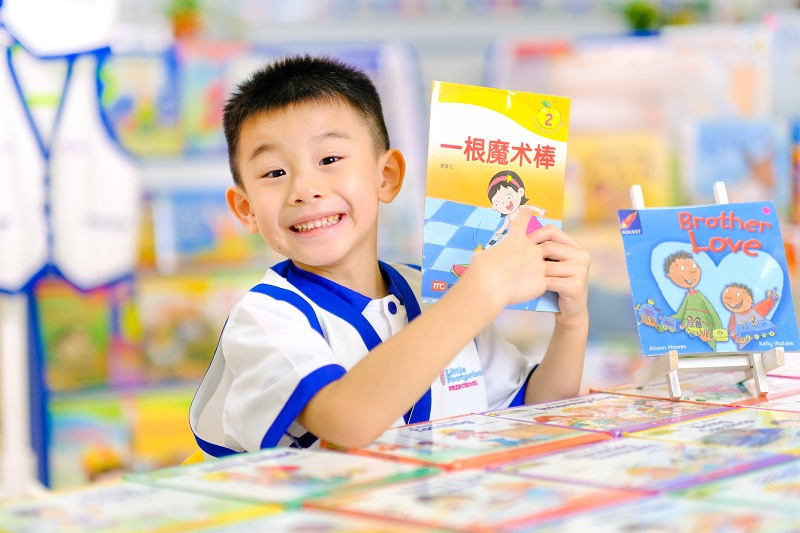
Did you know that language and literacy development start from babyhood?
Literacy skill is an important early childhood development as it builds their ability to speak, read, write, listen, think, and manage feelings.
Children sharpen their skills throughout their childhood from exposure at home and learning at preschools.
Children’s key literacy development milestones by age
Most may think that infants are too young as they can neither speak nor understand what we say. How could they be learning?
In fact, exposure to words at various ages offers children the opportunity to grasp a language. Sharpening literacy skills is not limited to reading books.
Before long, little ones develop their speech, reading and writing, and may surprise you when they are preschoolers.
Find out what the literacy development milestones are and how parents can support children’s growth.
3months to 12 months old (Infant Care): Playing with language
• Coos, babbles, imitates speech
• Starts to say 1 or 2 words by 12 months old
• Stares at pictures with interest
• Flips pages to explore
• Grasps things
At home, you can talk to your baby whenever you are interacting with him/her. It might seem strange to be having a one-way conversation at this point – but teachers at infant care do that with different babies too!
Talking to your baby introduces the idea of speech as he/she listens to your voice and tone. Pause when necessary and treat it like you’re talking to someone who understands. Soon enough, your little one will be cooing in response and perhaps even flashing you a gummy smile to acknowledge what you said!

1 to 2 years old (Playgroup): Experimenting with language
• Able to name people and things
• Says 2- to 3-word phrases
• Likes words that rhyme
• Tries to share his own experience through words
• Able to say 150 – 300 words by 24 months old
• Shows interest in books and wants to be read to
• Wants to be physically involved with books like flipping or pointing to pictures
• Responds to when being read aloud
• Scribbles with mostly unrecognisable doodles
At playgroup classes in Singapore, toddlers are constantly expanding their awareness and vocabulary bank. Parents can start with simple storybooks with pictures and text to increase vocabulary and association.
Have their little bums on your lap and read on! Reading books at bedtime is also a healthy way to foster good habits and unwind for the day, allowing parent-child bonding. Toddlers are also able to comprehend instructions – here’s your cue to ask questions to get them involved and garner responses.
For example, “Can you point to the rabbit on this page?” or “Let’s count how many blue hats there are!”. Curious learners get to hone their knowledge while using their hand-eye coordination skills to interact with you. These are some simple ways to sharpen their literacy acquisition and cultivate their love for reading from toddlerhood.

3 to 5 years old (Pre-nursery to nursery): Awareness exploration
• Able to form simple sentences at 3 years old
• Asks “why” questions at around 4 years old
• Acquires grammar understanding by 5 years old
• Requests for stories to be read
• Pretends to read
• Recognises basic words
• Understand that words and sounds have a connection
• Gains phonological awareness
• Identifies numbers and words around them
• Understands that print has meaning
• Able to write letters more legibly
• Can write own name by 5 years old
Is it too early to start reading at 3 years old? Childcare centres in Singapore like Little Footprints Preschool emphasise reading, listening, speaking, writing and comprehension skills, by engaging children in theme-based, experiential activities to promote language acquisition. Apart from the introduction of early language and literacy, the school extends a specialised programme known as The Librarian’s Code, designed to raise successful readers, writers and storytellers.
Working synergistically, their Bond ‘thru’ Reading (Home-School Partnership Reading Programme) specialised programme encourages families to bond through literacy activities. Parents are encouraged to read curated books with their children whilst strengthening writing development as children journal their post-reading thoughts.

5 to 6 years old (Kindergarten): Experimental reading and writing
• Is fluent and expressive with vocabulary
• Speaks in well-formed and complex sentences
• Uses all parts of speech
• Able to read independently
• Starts asking questions about new words that are unfamiliar
• Able to read books with more words like chapter books
• Strengthened comprehension of story details
• Able to understand jokes in text or comics
• Can write simple sentences and spell most sight words
• Able to blend phonetically to spell
Spelling is an important literacy milestone for preschoolers, and that’s why the Early Childhood Development Agency (ECDA) sets spelling as a learning goal for K2 children. Parents can also strengthen their preschooler’s dexterity and fine motor skill with creative writing activities.
Childcare centres like Little Footprints Preschool incorporate the ‘String a Word’ component in the Language & Literacy aspect of their core programme. Every week, children learn new sets of words via engaging methods. This helps sets a sense of familiarity with spelling as they transition to their primary school journey.
Childcare programme in Singapore supports children’s literacy development and beyond
Children in Little Footprints Preschool are exposed to a literacy and language-focused curriculum to build the foundation of raising bilingual children who are ready for P1. Blended with home-school partnership activities, parents can partake in reading, writing and speaking activities together to nurture kids in meeting their literacy development milestones.
Visit your nearest Little Footprints Preschool to find out how our programmes and activities will benefit your child. Book a centre tour to find out.
Follow us on social media to stay updated on our latest updates and happenings:




